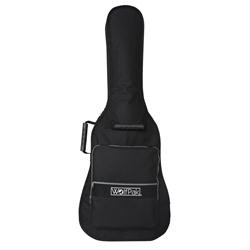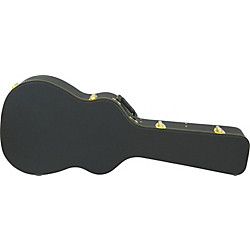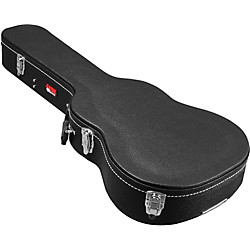Choosing the right guitar case is vital for protecting your instrument. At guitarplayers.net, we understand this, and that’s why we’ve created the ultimate guide on How To Buy A Guitar Case, ensuring your guitar remains safe whether you’re a beginner or a professional. This guide helps guitar enthusiasts find the perfect balance between protection and portability. Learn about gig bags, hard cases, and more to safeguard your valuable instrument.
1. Why Do You Need A Guitar Case?
A guitar case is essential for protecting your instrument from damage and environmental factors, therefore, investing in a good guitar case ensures your guitar’s longevity and playability. A guitar case is more than just an accessory, it’s an investment in the life of your instrument. Whether you are storing it at home or traveling to gigs, a guitar case provides a safe and secure environment.
1.1. Protection During Transit
A guitar case shields your instrument from bumps, scratches, and impacts during transport, as a result, your guitar arrives at every practice and performance in pristine condition. Transporting a guitar without a case is risky. A case acts as a buffer against accidental damage, which can save you costly repairs.
1.2. Environmental Protection
Cases protect guitars from humidity and temperature changes, keeping them in optimal condition, hence, guitars are less likely to suffer from warping or cracking. Guitars are particularly vulnerable to environmental changes. A good case helps maintain a stable environment, preventing damage to the wood and finish.
1.3. Secure Storage
A guitar case provides a safe place to store your guitar at home, preventing dust accumulation and accidental damage, therefore, your guitar remains clean and ready to play. Leaving a guitar exposed can lead to dust buildup and potential accidents. A case keeps your instrument in a controlled environment, free from hazards.
1.4. Peace Of Mind
Knowing your guitar is safe and secure provides peace of mind, allowing you to focus on your music, subsequently, you can transport and store your guitar without worry. Whether you are a professional musician or a hobbyist, the security of knowing your guitar is well-protected is invaluable.
2. What Are The Different Types Of Guitar Cases?
Choosing the right type of guitar case is crucial, since each type offers varying levels of protection and portability. The main types include gig bags, hard cases, flight cases, and hybrid cases.
2.1. Gig Bags (Soft Cases)
Gig bags are lightweight and portable, making them ideal for short trips and local gigs, however, they offer less protection than hard cases. Gig bags are typically made from nylon or other synthetic materials.
- Pros:
- Lightweight and easy to carry
- Affordable
- Often include storage pockets for accessories
- Cons:
- Offer minimal protection against impacts
- Less effective in extreme weather conditions
- May not be suitable for valuable instruments
 Musician transporting a guitar in a grey gig bag, emphasizing the ease of portability for local gigs and practices.
Musician transporting a guitar in a grey gig bag, emphasizing the ease of portability for local gigs and practices.
2.2. Hard Cases
Hard cases provide superior protection from physical damage and environmental factors, making them suitable for travel and storage, thus, they are favored by professionals and serious amateurs. Hard cases are typically made from wood, ABS plastic, or fiberglass.
- Pros:
- Excellent protection against impacts
- Good insulation against temperature and humidity
- Durable and long-lasting
- Cons:
- Heavier and bulkier than gig bags
- More expensive
- Less storage space
 Guitarist holding a black hard guitar case, highlighting the robustness and security it offers for protecting valuable instruments during transport and storage.
Guitarist holding a black hard guitar case, highlighting the robustness and security it offers for protecting valuable instruments during transport and storage.
2.3. Flight Cases
Flight cases are designed for air travel, providing maximum protection with heavy-duty construction and reinforced corners, therefore, these cases meet airline requirements for checked baggage. Flight cases are typically made from aluminum or reinforced plastic.
- Pros:
- Ultimate protection for air travel
- Heavy-duty construction to withstand rough handling
- Meets airline regulations
- Cons:
- Very heavy and bulky
- Most expensive option
- Not practical for everyday use
2.4. Hybrid Cases
Hybrid cases combine the features of hard and soft cases, offering a balance of protection and portability, hence, they are a versatile option for musicians who need both. Hybrid cases typically feature a hard shell with a padded interior and additional storage.
- Pros:
- Good balance of protection and portability
- More storage than hard cases
- Lighter than hard cases
- Cons:
- More expensive than gig bags
- May not offer as much protection as a hard case
- Can be bulkier than gig bags
3. What Materials Are Guitar Cases Made Of?
The materials used in guitar cases significantly impact their durability, weight, and protection level, since understanding these materials helps you make an informed decision. Common materials include nylon, wood, ABS plastic, fiberglass, and aluminum.
3.1. Nylon
Nylon is a lightweight and water-resistant material commonly used in gig bags, therefore, it offers basic protection and is easy to maintain. Nylon gig bags are suitable for musicians on a budget.
- Pros:
- Lightweight
- Water-resistant
- Affordable
- Cons:
- Minimal protection
- Not suitable for heavy use
- Can tear easily
3.2. Wood
Wood is a traditional material for hard cases, providing excellent protection and a classic look, as a result, wooden cases are sturdy and offer good insulation. Wood cases are often lined with plush material to cushion the guitar.
- Pros:
- Good protection
- Classic aesthetic
- Good insulation
- Cons:
- Heavy
- Can be expensive
- Susceptible to moisture damage
3.3. ABS Plastic
ABS plastic is a durable and impact-resistant material used in many hard cases, therefore, it offers good protection at a reasonable price. ABS plastic cases are lightweight compared to wood.
- Pros:
- Durable
- Impact-resistant
- Lightweight
- Cons:
- Less insulation than wood
- Can scratch easily
- May not be as aesthetically pleasing
 Guitarist holding a molded electric guitar case, showcasing its reinforced corners and plush lining for optimal protection and secure storage.
Guitarist holding a molded electric guitar case, showcasing its reinforced corners and plush lining for optimal protection and secure storage.
3.4. Fiberglass
Fiberglass is a strong and lightweight material used in high-end hard cases, as a result, it offers excellent protection and durability. Fiberglass cases are often preferred by professional musicians.
- Pros:
- Very strong
- Lightweight
- Excellent protection
- Cons:
- Expensive
- Can be brittle
- Difficult to repair
3.5. Aluminum
Aluminum is used in flight cases for its exceptional strength and durability, thus, it provides the ultimate protection for air travel. Aluminum cases can withstand significant impacts.
- Pros:
- Extremely strong
- Durable
- Provides maximum protection
- Cons:
- Very heavy
- Most expensive option
- Can dent
4. What Features Should You Look For In A Guitar Case?
When selecting a guitar case, consider features that enhance protection, convenience, and longevity, therefore, important features include padding, latches, handles, storage compartments, and hygrometers.
4.1. Padding
Adequate padding is crucial for protecting your guitar from impacts and scratches, thus, look for cases with thick, plush interiors. Padding should cover all surfaces of the guitar.
- Importance of Padding:
- Cushions the guitar during transport
- Prevents scratches and dents
- Absorbs shock from impacts
4.2. Latches And Hinges
Sturdy latches and hinges ensure the case remains securely closed, preventing accidental openings and damage, hence, look for metal latches and reinforced hinges. Latches should be easy to use but secure.
- Types of Latches and Hinges:
- Metal latches are more durable than plastic
- Reinforced hinges prevent breakage
- Locking latches provide added security
4.3. Handles And Straps
Comfortable handles and straps make it easier to carry your guitar, especially for long distances, so, look for padded handles and adjustable shoulder straps. Some cases also include backpack-style straps.
- Considerations for Handles and Straps:
- Padded handles reduce hand fatigue
- Adjustable straps accommodate different body sizes
- Backpack straps distribute weight evenly
4.4. Storage Compartments
Storage compartments provide convenient space for accessories like picks, strings, and cables, therefore, look for cases with multiple compartments and secure closures. Compartments should be easily accessible.
- Benefits of Storage Compartments:
- Keeps accessories organized
- Prevents accessories from damaging the guitar
- Conveniently located for easy access
4.5. Hygrometer
A hygrometer measures the humidity level inside the case, helping you maintain optimal conditions for your guitar, thus, this is especially important for wooden instruments. Digital hygrometers provide accurate readings.
- Why a Hygrometer is Important:
- Helps maintain proper humidity levels
- Prevents warping and cracking
- Extends the life of your guitar
5. How Do You Measure Your Guitar For A Case?
Accurately measuring your guitar ensures a snug and secure fit inside the case, therefore, proper measurements prevent unnecessary movement and potential damage. Measure the length, width, and depth of your guitar.
5.1. Length
Measure the overall length of the guitar from the headstock to the bottom of the body, hence, this is the most critical measurement for ensuring the guitar fits in the case. Use a measuring tape for accuracy.
- Steps for Measuring Length:
- Place the guitar on a flat surface
- Extend the measuring tape from the headstock to the bottom of the body
- Record the measurement in inches or centimeters
5.2. Width
Measure the width of the guitar at its widest point, typically the lower bout, since this measurement ensures the body fits comfortably in the case. Use a flexible measuring tape.
- Steps for Measuring Width:
- Locate the widest part of the guitar body
- Wrap the measuring tape around the body
- Record the measurement in inches or centimeters
5.3. Depth
Measure the depth of the guitar body from the top to the back, hence, this measurement ensures the case has enough room for the guitar’s thickness. Use a ruler or measuring tape.
- Steps for Measuring Depth:
- Place the ruler or measuring tape on the side of the guitar
- Measure from the top to the back of the body
- Record the measurement in inches or centimeters
5.4. Comparing Measurements
Compare your guitar’s measurements to the case’s interior dimensions, hence, ensure there is a snug fit without being too tight. Allow for a little extra space for padding.
- Tips for Comparing Measurements:
- Check the case manufacturer’s specifications
- Allow for extra space for padding
- If possible, test fit the guitar in the case
6. Acoustic Vs. Electric Guitar Cases: What’s The Difference?
Acoustic and electric guitars have different body shapes and sizes, requiring different types of cases, therefore, understanding these differences ensures you choose the correct case for your instrument. Acoustic guitars typically have larger bodies than electric guitars.
6.1. Size And Shape
Acoustic guitar cases are larger and designed to accommodate the full body of an acoustic guitar, whereas, electric guitar cases are smaller and shaped to fit the contours of an electric guitar. Acoustic cases may also have more depth.
- Key Differences in Size and Shape:
- Acoustic cases are larger and deeper
- Electric cases are more contoured
- Classical guitar cases are wider than acoustic cases
6.2. Padding And Support
Acoustic guitar cases often have more padding to protect the larger body, therefore, electric guitar cases may have specialized neck supports. Padding is essential for both types of cases.
- Padding and Support Considerations:
- Acoustic cases need full body padding
- Electric cases need good neck support
- Padding should be plush and non-abrasive
6.3. Storage
Acoustic guitar cases may have larger storage compartments to accommodate accessories like straps and tuners, however, electric guitar cases may have smaller, more specialized compartments. Consider your accessory needs when choosing a case.
- Storage Needs:
- Acoustic players may need more space for straps
- Electric players may need space for cables and effects pedals
- Both need space for picks and strings
6.4. Construction
Both acoustic and electric guitar cases can be made from various materials, but the construction is tailored to the specific instrument, therefore, acoustic cases may prioritize insulation, while electric cases may focus on impact resistance. Choose a case that meets your specific needs.
- Construction Materials:
- Wood for classic look and insulation
- ABS plastic for durability and lightweight
- Fiberglass for high-end protection
7. What Are Some Top Brands For Guitar Cases?
Several brands are known for producing high-quality guitar cases that offer excellent protection and durability, therefore, consider brands like Gator Cases, SKB Cases, and Hiscox Cases. These brands have a solid reputation in the music industry.
7.1. Gator Cases
Gator Cases offers a wide range of guitar cases at various price points, known for their durability and innovative designs, thus, they provide options for both acoustic and electric guitars. Gator Cases are a popular choice among musicians.
- Pros of Gator Cases:
- Wide range of options
- Durable construction
- Innovative designs
- Cons of Gator Cases:
- Some models may be bulky
- Quality can vary by price point
 Gator GWE hardshell guitar case for a 3/4-size acoustic guitar, emphasizing its rugged construction and plush interior for secure protection.
Gator GWE hardshell guitar case for a 3/4-size acoustic guitar, emphasizing its rugged construction and plush interior for secure protection.
7.2. SKB Cases
SKB Cases are known for their rugged, molded cases that provide excellent protection, therefore, they are a favorite among touring musicians. SKB Cases are designed to withstand harsh conditions.
- Pros of SKB Cases:
- Rugged construction
- Excellent protection
- Ideal for touring
- Cons of SKB Cases:
- Can be expensive
- Limited design options
7.3. Hiscox Cases
Hiscox Cases are high-end cases known for their lightweight yet incredibly strong construction, hence, they are a top choice for protecting valuable instruments. Hiscox Cases are made in the UK.
- Pros of Hiscox Cases:
- Lightweight
- Extremely strong
- High-end protection
- Cons of Hiscox Cases:
- Very expensive
- Limited availability
7.4. Fender Cases
Fender Cases are designed specifically for Fender guitars, ensuring a perfect fit and reliable protection, therefore, they are a great option for Fender enthusiasts. Fender Cases often feature the iconic Fender logo.
- Pros of Fender Cases:
- Perfect fit for Fender guitars
- Reliable protection
- Iconic Fender design
- Cons of Fender Cases:
- May not fit other guitar brands
- Can be pricey
7.5. Gibson Cases
Gibson Cases are tailored for Gibson guitars, providing a snug fit and classic style, thus, they are a must-have for Gibson owners. Gibson Cases often feature plush interiors and sturdy latches.
- Pros of Gibson Cases:
- Perfect fit for Gibson guitars
- Classic style
- Reliable protection
- Cons of Gibson Cases:
- May not fit other guitar brands
- Can be expensive
8. Where Can You Buy Guitar Cases?
Guitar cases are available at various retailers, both online and in physical stores, thus, consider options like music stores, online retailers, and used marketplaces. Each offers different advantages.
8.1. Music Stores
Music stores offer a hands-on shopping experience where you can test fit your guitar in different cases, therefore, you can get expert advice from knowledgeable staff. Local music stores are a great resource for guitarists.
- Pros of Music Stores:
- Hands-on shopping experience
- Expert advice
- Opportunity to test fit
- Cons of Music Stores:
- May have limited selection
- Prices may be higher
8.2. Online Retailers
Online retailers like Amazon and Sweetwater offer a wide selection of guitar cases at competitive prices, as a result, you can read customer reviews and compare different models. Online shopping is convenient and offers a vast selection.
- Pros of Online Retailers:
- Wide selection
- Competitive prices
- Customer reviews
- Cons of Online Retailers:
- Cannot test fit before buying
- Shipping costs
- Potential for damage during shipping
8.3. Used Marketplaces
Used marketplaces like Craigslist and Reverb can offer great deals on guitar cases, therefore, you can find high-quality cases at a fraction of the price. Inspect the case carefully before buying.
- Pros of Used Marketplaces:
- Great deals
- Opportunity to find vintage cases
- Support local sellers
- Cons of Used Marketplaces:
- May require inspection
- No warranty
- Potential for scams
8.4. Direct From Manufacturers
Buying directly from manufacturers like Gator or SKB ensures you get the latest models and warranty protection, thus, you can also find detailed product information. Direct purchases offer peace of mind.
- Pros of Buying Direct:
- Latest models
- Warranty protection
- Detailed product information
- Cons of Buying Direct:
- May be more expensive
- Limited selection compared to retailers
9. How Much Should You Expect To Spend On A Guitar Case?
The cost of a guitar case varies widely depending on the type, material, and brand, therefore, budget accordingly based on your needs and the value of your instrument. Prices range from affordable gig bags to high-end flight cases.
9.1. Gig Bags
Gig bags typically range from $30 to $100, offering basic protection for casual use, hence, they are a budget-friendly option for beginners. Prices depend on the padding and features.
- Price Range: $30 – $100
- Typical Features:
- Lightweight nylon construction
- Basic padding
- Storage pockets
9.2. Hard Cases
Hard cases range from $100 to $500, providing good protection for regular use and travel, therefore, they are a worthwhile investment for serious musicians. Prices depend on the material and construction.
- Price Range: $100 – $500
- Typical Features:
- Wood or ABS plastic construction
- Plush interior
- Sturdy latches
9.3. Flight Cases
Flight cases range from $300 to $1000 or more, offering maximum protection for air travel and professional use, thus, they are essential for touring musicians. Prices depend on the size and features.
- Price Range: $300 – $1000+
- Typical Features:
- Aluminum or reinforced plastic construction
- Heavy-duty padding
- Meets airline regulations
9.4. Hybrid Cases
Hybrid cases range from $80 to $300, balancing protection and portability, therefore, they are a versatile option for musicians who need both. Prices depend on the materials and features.
- Price Range: $80 – $300
- Typical Features:
- Hard shell with padded interior
- Good balance of protection and portability
- Additional storage
10. How To Maintain Your Guitar Case
Proper maintenance extends the life of your guitar case and ensures it continues to protect your instrument, therefore, regular cleaning and inspection are essential. Follow these tips to keep your case in top condition.
10.1. Cleaning
Clean your guitar case regularly to remove dust, dirt, and grime, hence, use a soft cloth and mild cleaning solution. Avoid harsh chemicals that can damage the case material.
- Cleaning Tips:
- Use a soft cloth
- Apply a mild cleaning solution
- Wipe down the exterior and interior
- Allow the case to air dry
10.2. Inspection
Inspect your guitar case regularly for signs of wear and tear, such as loose latches, torn padding, and damaged hinges, thus, address any issues promptly to prevent further damage. Regular inspection can prevent costly repairs.
- Inspection Checklist:
- Check latches and hinges
- Inspect padding for tears
- Examine the exterior for damage
- Ensure the handle is secure
10.3. Storage
Store your guitar case in a dry, cool place away from direct sunlight and extreme temperatures, therefore, this prevents warping, cracking, and other damage. Proper storage extends the life of your case.
- Storage Guidelines:
- Store in a dry, cool place
- Avoid direct sunlight
- Keep away from extreme temperatures
- Store upright to prevent warping
10.4. Repair
Repair any damage to your guitar case promptly to maintain its protective qualities, therefore, replace loose latches, torn padding, and damaged hinges. Professional repair services are available for serious damage.
- Repair Tips:
- Replace loose latches
- Repair torn padding
- Fix damaged hinges
- Consult a professional for serious damage
10.5. Humidity Control
Use a hygrometer to monitor the humidity level inside your guitar case, thus, maintain optimal conditions to prevent damage to your instrument. Use a humidifier or dehumidifier as needed.
- Humidity Control Measures:
- Use a hygrometer to monitor humidity levels
- Use a humidifier in dry climates
- Use a dehumidifier in humid climates
- Maintain humidity levels between 45% and 55%
Choosing the right guitar case is a crucial investment for any guitar player, and with this comprehensive guide, you’re now equipped with the knowledge to make an informed decision. Remember, the best case is one that fits your specific needs, playing style, and budget. Whether you’re a beginner strumming your first chords or a seasoned professional hitting the road, protecting your instrument is paramount.
Ready to take the next step? Explore guitarplayers.net for a wealth of resources to enhance your musical journey. Discover in-depth guitar lessons tailored to all skill levels, browse our extensive collection of guitar tabs and sheet music, and read unbiased reviews of the latest gear and accessories. Join our vibrant community of guitar enthusiasts in the U.S.A., where you can connect with fellow players, share your experiences, and learn from the best.
Don’t wait—visit guitarplayers.net today and unlock your full potential as a guitarist. Your perfect guitar case and a world of musical possibilities await. Contact us at Address: 1140 Boylston Street, Boston, MA 02215, United States. Phone: +1 (617) 747-2261. Website: guitarplayers.net.
FAQ: Buying A Guitar Case
1. What is the difference between a hard case and a gig bag?
A hard case offers superior protection from impacts and environmental factors, while a gig bag is lightweight and portable but provides less protection, hence, choose based on your needs for protection versus portability.
2. How do I measure my guitar to ensure it fits in the case?
Measure the length, width, and depth of your guitar, and compare these measurements to the interior dimensions of the case, thus, ensure a snug fit without being too tight.
3. What features should I look for in a guitar case?
Look for adequate padding, sturdy latches and hinges, comfortable handles and straps, storage compartments, and a hygrometer, therefore, these features enhance protection and convenience.
4. Are acoustic and electric guitar cases the same?
No, acoustic and electric guitars have different body shapes and sizes, requiring different types of cases, therefore, ensure you choose a case designed for your specific type of guitar.
5. What are some top brands for guitar cases?
Top brands include Gator Cases, SKB Cases, Hiscox Cases, Fender Cases, and Gibson Cases, hence, these brands are known for their quality and durability.
6. Where can I buy guitar cases?
You can buy guitar cases at music stores, online retailers, used marketplaces, and directly from manufacturers, thus, each offers different advantages in terms of selection and price.
7. How much should I expect to spend on a guitar case?
The cost varies depending on the type of case, ranging from $30 for a gig bag to $1000+ for a flight case, therefore, budget according to your needs and the value of your instrument.
8. How do I maintain my guitar case?
Clean your case regularly, inspect it for damage, store it properly, and repair any issues promptly, hence, proper maintenance extends the life of your case.
9. What is a flight case?
A flight case is a heavy-duty case designed for air travel, providing maximum protection with reinforced corners and durable construction, as a result, it meets airline regulations for checked baggage.
10. Why is humidity control important for guitar cases?
Humidity control prevents warping, cracking, and other damage to your guitar, especially for wooden instruments, therefore, use a hygrometer and humidifier/dehumidifier to maintain optimal conditions inside the case.


